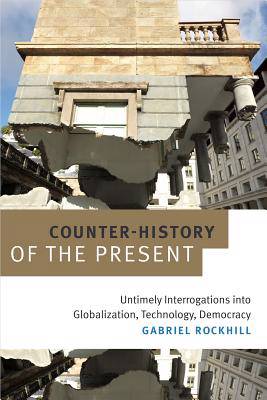
Bedankt voor het vertrouwen het afgelopen jaar! Om jou te bedanken bieden we GRATIS verzending (in België) aan op alles gedurende de hele maand januari.
- Afhalen na 1 uur in een winkel met voorraad
- In januari gratis thuislevering in België
- Ruim aanbod met 7 miljoen producten
Bedankt voor het vertrouwen het afgelopen jaar! Om jou te bedanken bieden we GRATIS verzending (in België) aan op alles gedurende de hele maand januari.
- Afhalen na 1 uur in een winkel met voorraad
- In januari gratis thuislevering in België
- Ruim aanbod met 7 miljoen producten
Zoeken
Counter-History of the Present
Untimely Interrogations into Globalization, Technology, Democracy
Gabriel Rockhill
Hardcover | Engels
€ 144,95
+ 289 punten
Uitvoering
Omschrijving
In Counter-History of the Present Gabriel Rockhill contests, dismantles, and displaces one of the most widespread understandings of the contemporary world: that we are all living in a democratized and globalized era intimately connected by a single, overarching economic and technological network. Noting how such a narrative fails to account for the experiences of the billions of people who lack economic security, digital access, and real political power, Rockhill interrogates the ways in which this grand narrative has emerged in the same historical, economic, and cultural context as the fervid expansion of neoliberalism. He also critiques the concurrent valorization of democracy, which is often used to justify U.S. military interventions on the behalf of capital. Developing an alternative account of the current conjuncture that acknowledges the plurality of lived experiences around the globe and in different social strata, he shifts the foundations upon which debates about the contemporary world can be staged. Rockhill's counter-history thereby offers a new grammar for historical narratives, creating space for the articulation of futures no longer engulfed in the perpetuation of the present.
Specificaties
Betrokkenen
- Auteur(s):
- Uitgeverij:
Inhoud
- Aantal bladzijden:
- 160
- Taal:
- Engels
Eigenschappen
- Productcode (EAN):
- 9780822369646
- Verschijningsdatum:
- 5/05/2017
- Uitvoering:
- Hardcover
- Formaat:
- Genaaid
- Afmetingen:
- 157 mm x 234 mm
- Gewicht:
- 385 g

Alleen bij Standaard Boekhandel
+ 289 punten op je klantenkaart van Standaard Boekhandel
Beoordelingen
We publiceren alleen reviews die voldoen aan de voorwaarden voor reviews. Bekijk onze voorwaarden voor reviews.









